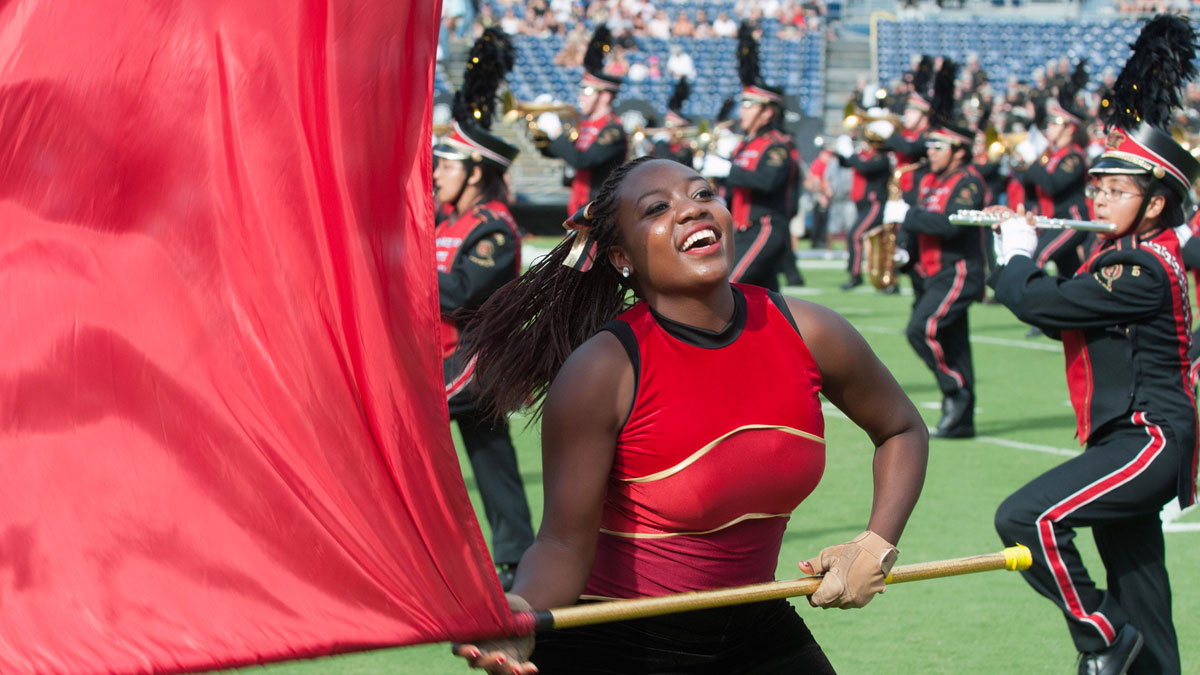SDSU Grad Q&A: Nicholas Leath-Lacy

Nicholas Leath-Lacy
School of Communication
Hometown Emerald Hills in San Diego
Can you describe a little bit about yourself and what led you to pursue Communication as an area of study?
Yes, I am proud to announce that I will be continuing my graduate studies at Purdue University in the Brian Lamb School of Communication-PhD program! I will soon transition to Purdue in a few short weeks to work on research in a Summer Bridge Graduate Fellowship. Here, I will work with my Ph.D. advisor on a research project. I will also be finishing my SDSU journey by working on a year-long social justice project in the School of Communication here at SDSU.
As a Communication major, and soon to be Communication master’s graduate, I am in love with Communication because it allows me to find myself as a researcher. In essence, I live by the idea that “research is me-search”, and as such, “leaders are readers.” With this, Communication is who I am, embodied, interpersonal, organizational as well as health communication. As a Black, cisgender male, I explore the many phenomena that exist in the world today through a very intersectional communicative lens. And I would not have it any other way.
When did you decide to pursue graduate studies and what did that process entail?
I began searching for Ph.D. programs (seriously) mid-fall semester of 2020. I know I was a little late, but I felt my training in SDSU’s School of Communication prepared me well for the next step. However, the full story is that I had been perusing several Ph.D. programs and actually jobs and internships Fall 2019/Spring 2020. Starting a year early can help pace yourself, and figure out what it is you want, and equally, do not want. I eliminated jobs, and internships, and keeping it all the way real, many of them eliminated me. This made my path to sticking with advancing my education much easier.
The process was simple (in theory), prepare a well-written, true to life personal statement, diversity statement, curriculum vitae (for Ph.D. hopefuls), and your best writing sample. Although I said this process was simple, in hindsight, it requires a lot of mental effort while simultaneously attending classes, attending conferences, teaching, and preparing a thesis proposal. But, if you are doing what you love, then you become part of the process, as does the process become part of you!
When did you receive your graduate program acceptance and what was your reaction?
I received several Ph.D. offers in my pursuit of advanced graduate studies and the first offer came in early February and it left me speechless! I read the email and nearly passed out! To explain, I felt a bit of imposter syndrome and extreme anxiety as I applied to the handful of schools because I applied to eight Ph.D. programs two years ago and got rejected from all eight! So, this time around, the first acceptance was a halleluiah moment for me!
As fate would have it, out of five top programs in the nation, the running really came down to two. Instead of being told a hard NO from all of the programs, this time, I received a Presidential Graduate Assistantship (the first of its kind) from one institution that totaled over $220k in financial support for four years. Another institution offered me over $250k in multiple fellowships/financial support for four years – which was the institution I chose. As such, my reaction was one of overwhelmed joy because hard work really does pay off!
What advice do you have for fellow students, regardless of their field, looking to attend graduate school post-graduation?
If I could share a bit of advice with other graduates it would be this; trust the process, but most importantly trust yourself within the process! Yes, consult your professors, mentors, family, friends, but also follow your heart! No matter the career, field, program, or organization, it will be you doing the work! Listen to your passions and fuel your desires! Do not live a life for anyone other than yourself! Dream it, feel it, and do it! Do not stand in your own way, the future/best you is counting on it!
What is it that you are most looking forward to as you kick start this next chapter? How did SDSU prepare you for success not only at the university but after graduation?
What I am most looking forward to are the many opportunities Purdue University has for me. I am participating in a Summer Bridge Fellowship this summer which is incredible! I am also looking forward to next summer as Purdue offered me a prestigious Charles Redding Fellowship for summer 2022! Additionally, I have been offered a position in Discovery Park at Purdue for Spring 2022! I am also excited to try my luck with an internship with either the CDC or the FDA, or both! There are so many opportunities that I cannot wait to be a part of and I am excited for all of it!
Michael Rapp, my supervisor, has played a very integral role in my preparation and success as an instructor and more importantly, as a human. And of course, SDSU School of Communication’s professors such as Dr. Chen, Dr. Geist-Martin, Dr. Asante, Dr. Canary, Dr. Record, Dr. Ray, Dr. Savage, and Dr. Martinez, Dr. Dikstra-Dyvette have prepared me for these opportunities whether it was in class, out of class, or personal encouragement and support! The rigor of the School of Communication Master’s and the high bar of excellence has prepared me for not only the Ph.D. but also beyond. SDSU has made me a much better researcher and writer! Also, Dr. Channin, Dr. Green, Dr. Wright, and Dr. Wood have all been extremely supportive to me during my time at SDSU!
What experience at SDSU has changed your life the most?
There are so many great memories that changed my life for the better while at SDSU. If I had to point to one, I would probably point out the time the Director of the School of Communication, Dr. Heather Canary, and the Associate Director of the School of Communication, Dr. Lourdes Martinez hired me to help transform the School of Communication. In this transformation, we implemented Social Justice course learning outcomes throughout each undergraduate course in the School of Communication. Being a part of anti-racist, and social justice initiatives on a department level was perhaps exactly what I needed to become more passionate in my research, which rests between the intersections of race, organizations, and mental/public health. Being a part of the anti-racist, and social justice project also propelled me to do other important work such as give a graduate student colloquium and co-facilitate an anti-racist professional development workshop with my advisor and mentor Dr. Yea-Wen Chen for another leading university. All in all, I would not be the person I am today without Dr. Yea-Wen Chen, Dr. Heather Canary, Dr. Patricia Geist-Martin, Dr. Tonika Green, Dr. Luke Wood, and the many School of Communication professors, thank you!
The content within this article has been edited by Lizbeth Persons.

